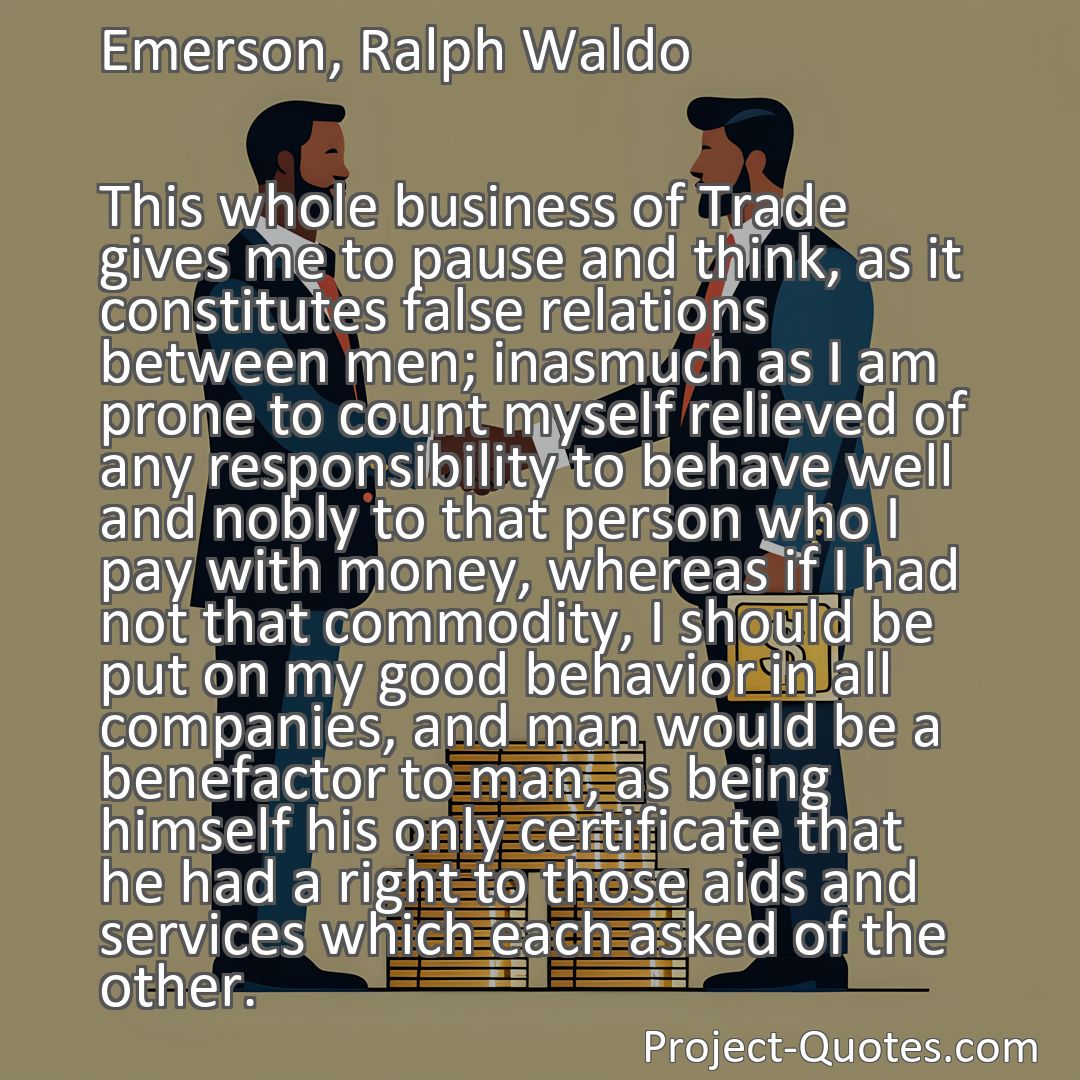This whole business of Trade gives me to pause and think, as it constitutes false relations between men; inasmuch as I am prone to count myself relieved of any responsibility to behave well and nobly to that person who I pay with money, whereas if I had not that commodity, I should be put on my good behavior in all companies, and man would be a benefactor to man, as being himself his only certificate that he had a right to those aids and services which each asked of the other.
Emerson, Ralph Waldo
Trade is a fundamental aspect of human society that shapes our relationships and interactions. However, the quote suggests that trade creates false relations and diminishes our sense of responsibility and accountability towards others. The author proposes that without the mediation of money, we would rely on our own intrinsic moral compass, treating each other with greater respect and consideration. It is important to approach trade with mindfulness, gratitude, empathy, and a commitment to building meaningful relationships in order to harness its potential for fostering a socially just and compassionate society.
Table of Contents
- 1 This whole business of Trade gives me to pause and think, as it constitutes false relations between men; inasmuch as I am prone to count myself relieved of any responsibility to behave well and nobly to that person who I pay with money, whereas if I had not that commodity, I should be put on my good behavior in all companies, and man would be a benefactor to man, as being himself his only certificate that he had a right to those aids and services which each asked of the other.
- 2 Emerson, Ralph Waldo
- 3 Meaning of Quote – This whole business of Trade gives me to pause and think, as it constitutes false relations between men; inasmuch as I am prone to count myself relieved of any responsibility to behave well and nobly to that person who I pay with money, whereas if I had not that commodity, I should be put on my good behavior in all companies, and man would be a benefactor to man, as being himself his only certificate that he had a right to those aids and services which each asked of the other.
- 4 Freely Shareable Quote Image
- 5 Related
Meaning of Quote – This whole business of Trade gives me to pause and think, as it constitutes false relations between men; inasmuch as I am prone to count myself relieved of any responsibility to behave well and nobly to that person who I pay with money, whereas if I had not that commodity, I should be put on my good behavior in all companies, and man would be a benefactor to man, as being himself his only certificate that he had a right to those aids and services which each asked of the other.
Trade is a fundamental aspect of human society, one that shapes our relationships and interactions with others on a daily basis. It is through trade that we exchange goods, services, and resources, creating a complex web of connections that spans across borders and cultures. However, as the quote suggests, this notion of trade raises some interesting questions about the nature of our interactions with one another.
The author of the quote ponders the idea that trade creates false relations between individuals. When we engage in a transaction, it seems that we often view the other person solely as a means to an end a provider of goods or services that we desire. We hand over money, and in return, we receive what we need or desire. In this process, there is often a sense of detachment and lack of personal connection.
The author suggests that this detachment contributes to a diminished sense of responsibility and accountability towards those with whom we engage in trade. When we pay someone for a product or service, we may feel relieved of any obligation to treat that person well or behave nobly towards them. It is as if the act of exchanging money severs the ethical ties that would otherwise bind us together. However, the author proposes that if we did not have money to mediate our interactions, our behavior towards one another would be significantly different.
Without the mediation of money, the author argues, we would be compelled to rely on our own intrinsic moral compass when interacting with others. We would be more conscious of our behavior and the impact it has on those around us. In essence, the absence of money as a medium of exchange would force us to recognize our interdependence and treat one another with greater respect and consideration.
This line of thinking suggests that trade, as it is currently practiced, has the potential to dehumanize our relationships. It reduces individuals to mere economic agents, valuing them solely for their ability to provide us with what we want or need. In this context, the act of trade becomes transactional and devoid of the deeper connections that make us human.
However, it is important to consider that trade itself is not inherently negative. In fact, it has played a crucial role in the development and progress of human civilization. Trade allows us to access resources and goods that may not be available locally, promoting diversity and supporting economic growth. It fosters innovation, competition, and specialization, leading to improved efficiency and higher living standards.
Yet, the critical question remains: how can we ensure that trade does not erode our sense of responsibility and compassion towards others? How can we cultivate a trade system that allows us to benefit from the advantages of commerce while simultaneously fostering genuine connections and promoting ethical behavior?
One possible solution lies in adopting a more conscious and mindful approach to trade. Instead of viewing it solely as an economic transaction, we can remind ourselves of the human beings behind the exchange. Each person involved in a trade carries with them a unique story, a set of experiences, and aspirations. By acknowledging this, we can begin to reestablish the human connection that might otherwise be lost.
Moreover, we can engage in trade with a sense of gratitude and appreciation for the services or goods we receive. Rather than taking them for granted, we can recognize the efforts, skills, and resources that went into producing them. This gratitude can serve as a reminder of the interconnectedness that underlies trade, encouraging us to treat others with dignity and respect.
In addition, fostering a sense of empathy towards those with whom we trade can significantly impact our behavior. Empathy allows us to put ourselves in someone else’s shoes, to understand their perspectives, needs, and emotions. By cultivating empathy, we can become more attuned to the impact of our actions on others and be motivated to act in ways that benefit both parties involved.
Furthermore, trade can be an opportunity to build relationships and strengthen social ties. Rather than engaging in faceless transactions, we can seek to establish connections with those we trade with. This can be done through open and honest communication, willingness to listen, and a genuine interest in one another’s well-being. By building relationships, we can transform trade into a means of fostering social cohesion and community development.
Lastly, it is crucial to recognize that trade is not solely a matter of economic exchange but is deeply embedded within a larger social, political, and cultural context. The systems and institutions that govern trade play a significant role in shaping the nature and outcomes of our transactions. Therefore, it is necessary to critically examine and challenge any unjust structures or practices that perpetuate inequality and exploitation.
In conclusion, while trade has the potential to create false relations between individuals, it is up to us to redefine and reshape this aspect of human interaction. By approaching trade with mindfulness, gratitude, empathy, and a commitment to building meaningful relationships, we can mitigate the negative effects and harness its potential for fostering a more socially just and compassionate society. Trade is not solely an economic act but a reflection of our shared humanity, and it is through recognizing and embodying this truth that we can truly benefit from the power of trade.
I hope this quote inspired image brings you hope and peace. Share it with someone who needs it today!


